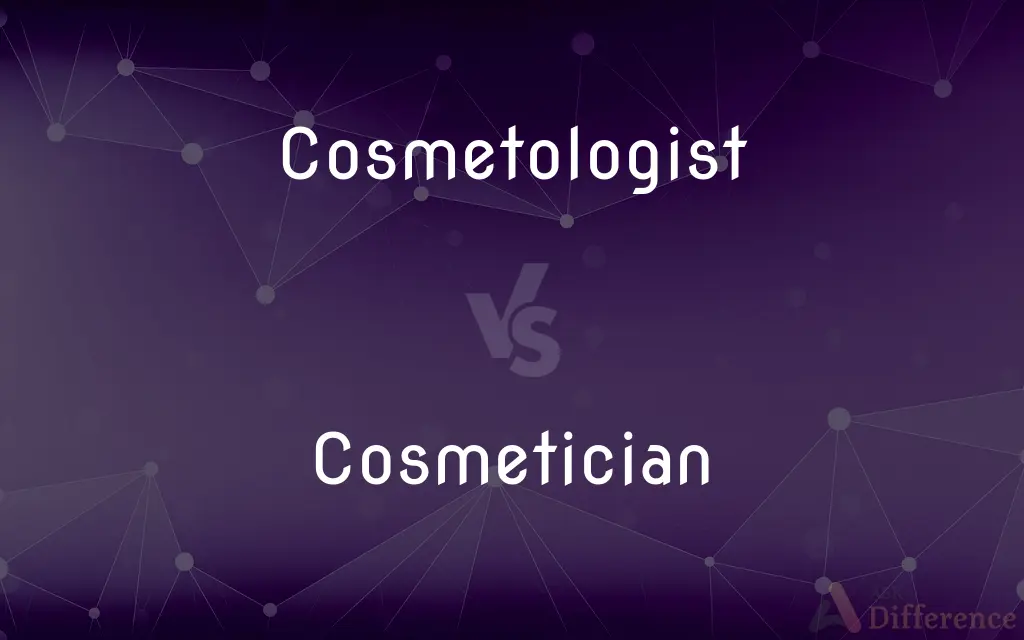Cosmetologist vs. Cosmetician — What's the Difference?
By Tayyaba Rehman & Urooj Arif — Updated on April 30, 2024
A cosmetologist provides a broader range of beauty services including hair, skin, and nails, while a cosmetician focuses more on skincare and makeup application.

Difference Between Cosmetologist and Cosmetician
Table of Contents
ADVERTISEMENT
Key Differences
Cosmetologists are trained professionals who specialize in a variety of beauty services such as hair cutting, coloring, and styling, skincare, and nail treatments. They often hold licenses that allow them to perform a wide array of cosmetic procedures. On the other hand, cosmeticians primarily focus on skincare and makeup. They are experts in makeup application, skin health, and may provide personalized advice on beauty products.
While cosmetologists can work in diverse settings including salons, spas, and beauty schools, cosmeticians often find employment in retail settings, such as department stores or specialty beauty stores, offering product advice and makeup services to customers. Whereas, cosmetologists typically undergo more extensive training, including coursework in anatomy, physiology, and cosmetology laws, which qualifies them for a broader range of services beyond just makeup.
Cosmetologists are required to complete a state-approved training program and pass a licensing exam, reflecting their comprehensive skill set in beauty treatment. In contrast, cosmeticians may not require formal licensing depending on their location and the specific services they provide, often focusing on non-invasive treatments like makeup application.
In terms of services offered, cosmetologists can provide holistic beauty solutions, including facials, perms, hair removal, and more, catering to a client's overall appearance. Meanwhile, cosmeticians specialize in enhancing facial aesthetics through makeup, advising on skin care products, and sometimes performing light skincare treatments such as facials.
The career paths for cosmetologists and cosmeticians also differ significantly. Cosmetologists have opportunities for advancement in various fields of beauty, potentially opening their own salons or becoming beauty instructors. Cosmeticians, however, might advance within the retail industry, becoming brand representatives or managers of cosmetic departments.
ADVERTISEMENT
Comparison Chart
Services Offered
Hair, skin, nails, makeup
Skincare, makeup
Employment Settings
Salons, spas, beauty schools
Retail stores, beauty counters
Training
Extensive, includes various beauty aspects
Often limited to makeup and skincare
Licensing
Required in most regions
Not always required
Focus
Broad beauty care
Facial aesthetics and skincare products
Compare with Definitions
Cosmetologist
A trained and licensed professional in beauty treatments.
A cosmetologist may offer hair coloring services alongside facials and manicures.
Cosmetician
A specialist in makeup and skincare products.
The cosmetician at the store helped me choose the right foundation shade.
Cosmetologist
Someone who performs hair, skin, and nail services.
She consulted a cosmetologist to find the perfect hairstyle for her wedding.
Cosmetician
A professional who advises on cosmetic products.
I asked a cosmetician for recommendations on moisturizers.
Cosmetologist
A licensed practitioner of comprehensive beauty care.
He became a cosmetologist after completing two years of training.
Cosmetician
Someone focused on enhancing facial aesthetics.
The cosmetician demonstrated how to apply eye makeup effectively.
Cosmetologist
A professional in cosmetic procedures and treatments.
The cosmetologist at the spa customized a skincare routine for me.
Cosmetician
A provider of specialized beauty advice.
Our local cosmetician hosts makeup workshops.
Cosmetologist
A beauty specialist with diverse skills.
The cosmetologist recommended a skin treatment that complemented my hair color.
Cosmetician
A beauty expert usually found in retail settings.
The cosmetician shared the latest trends in skincare products.
Cosmetologist
The study or art of cosmetics and their use.
Cosmetician
One whose occupation is manufacturing, selling, or applying cosmetics.
Cosmetologist
A person who advises people (normally women) on cosmetics and other beauty treatments; a beautician.
Cosmetician
A person skilled at applying cosmetics.
Cosmetologist
An expert in the use of cosmetics.
Cosmetician
A person who manufactures or sells cosmetics.
Cosmetologist
An expert in the use of cosmetics
Cosmetician
Someone who sells or applies cosmetics
Cosmetician
Someone who works in a beauty parlor
Common Curiosities
What are the primary duties of a cosmetician?
A cosmetician primarily advises on and applies makeup, focusing also on skincare.
Is licensing required for both cosmetologists and cosmeticians?
Cosmetologists require licensing, but cosmeticians may not, depending on their specific roles and local regulations.
How can a cosmetician help me choose makeup?
A cosmetician can help you choose makeup that suits your skin type, tone, and personal style.
Can a cosmetician provide skin treatments?
While some cosmeticians might offer basic skin treatments like facials, they generally focus on makeup.
What is the difference in training between a cosmetologist and a cosmetician?
Cosmetologists receive broader training covering all aspects of beauty care, while cosmeticians may focus mainly on makeup and skincare.
Can a cosmetologist perform all the duties of a cosmetician?
Yes, a cosmetologist's training typically includes makeup, allowing them to perform the duties of a cosmetician.
Where do cosmeticians typically work?
Cosmeticians usually work in retail environments, such as cosmetic sections in department stores.
What should I look for in a good cosmetician?
Look for a cosmetician with thorough product knowledge, excellent customer service skills, and an understanding of aesthetics.
What training does a cosmetologist undergo?
A cosmetologist completes a comprehensive program covering hair, skin, and nail care, followed by a licensing exam.
What are the advancement opportunities for a cosmetician?
Cosmeticians can advance to managerial roles within retail or become brand ambassadors.
How does the role of a cosmetician differ in different countries?
The role can vary significantly, with some countries requiring formal qualifications for cosmeticians, especially if they provide certain skin treatments.
What can I expect to learn from a cosmetologist?
From a cosmetologist, you can learn about comprehensive beauty treatments, including hair care, skin care, and nail care.
Do cosmetologists work with any age group?
Yes, cosmetologists can provide services to all age groups, depending on their specific needs and preferences.
Can cosmetologists and cosmeticians work together?
Yes, in many beauty environments, cosmetologists and cosmeticians collaborate to provide a full range of beauty services.
What are potential career paths for a cosmetologist?
Cosmetologists can become salon owners, beauty consultants, or instructors in beauty schools.
Share Your Discovery

Previous Comparison
Insurrection vs. Treason
Next Comparison
Realism vs. ExpressionismAuthor Spotlight
Written by
Tayyaba RehmanTayyaba Rehman is a distinguished writer, currently serving as a primary contributor to askdifference.com. As a researcher in semantics and etymology, Tayyaba's passion for the complexity of languages and their distinctions has found a perfect home on the platform. Tayyaba delves into the intricacies of language, distinguishing between commonly confused words and phrases, thereby providing clarity for readers worldwide.
Co-written by
Urooj ArifUrooj is a skilled content writer at Ask Difference, known for her exceptional ability to simplify complex topics into engaging and informative content. With a passion for research and a flair for clear, concise writing, she consistently delivers articles that resonate with our diverse audience.












































